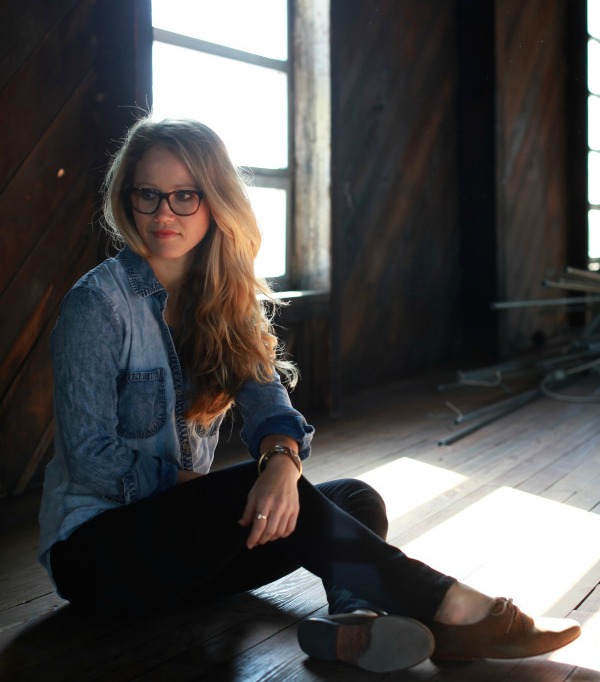Zoe Cleary, co-founder of Nisolo, talks shoes, sustainability and her Nashville startup.
Kelly Taber: I love the simplicity of your shoes, and how it seems you have in mind that the wearer will be on some kind of an adventure. Are you inspired by European fashion? How are they designed?
Zoe Cleary: Thank you. I’ve always been drawn to different textures, fabrics, leathers and unique materials in general. I love simple, classic style comprised of materials that you immediately want to touch and wear. I grew up admiring my mother’s elegant style she developed growing up between Italy and Southern California. After college I moved to Italy and then France and have absolutely been influenced by classic European style.
Related: Upcycling Shoes for Shoe Week, 4 DIY Shoe Refashions
We create products for the wearer to live in. These are the shoes you wear to work, out to dinner with friends, or walking through the streets of Madrid. The simplicity of the designs allows them to fit in anywhere, while being relevant and comfortable at the same time.
KT: Zoe, you were previously in the fashion industry in Los Angeles and New York City, and Patrick was previously in international development and microfinance. How did you meet and become business partners?
ZC: Patrick and I were introduced by a mutual friend who went to college with Patrick and I met working in the fashion industry in NYC. Patrick was working in microfinance in Peru and after we were email introduced, we skyped about the vision he had for a shoe company that supported the work of local Peruvian shoemakers. I was looking for a fashion job that had a social mission behind it and had developed a heart for Latin America having spent a lot of time traveling and living there. I flew down to Peru two weeks later to meet Patrick and tour the shoe industry in Trujillo. As soon as I saw the level of talent that existed, met some of the shoemakers and toured the markets, I was hooked. 1.5 months later, after quitting my job in NYC and selling all of my furniture, I was back in Peru – this time on a one-way ticket starting up the business with Patrick!
KT: Do you ever have conflicts trying to meld social impact and fashion?
ZC: From a marketing perspective, there is definitely something to be said about creating a balance of a relevant fashion brand while communicating the social impact behind it. We have had many conversations about this and are constantly focused on promoting our product first and tastefully explaining the profundity of the brand and its impact at the same time.
The reality is that our competitors are manufacturing in places where the cost of manual labor is legally, absurdly low. We started Nisolo to create a new reality for producers, to use the fashion industry as a vehicle to bring formative change in the lives of producers. Constantly, we have to figure out other ways to maintain competitive margins in order to maintain above fair trade wages for our shoemakers. This makes running our business much harder than it would be if our social impact were not so important to us and in the DNA of the brand.
KT: I noticed that Nisolo shoes are currently sold in the United States and Canada. How many retailers do you currently have and are you planning to grow into other markets?
ZC: We currently work with about 50 small boutiques across the US and in Canada. We have had international wholesale inquiries that we will consider in the future as our distribution grows. We ship internationally from our website and do send a decent amount to Europe, Australia and Asia. Through our website, we have customers who have purchased from all 50 states and over 30 different countries.

KT: It’s cool that you are based in Nashville, Tenn. I’ve read that Nashville is one of the top cities in the United States for entrepreneurial startups. What can you tell us about Nashville style?
ZC: Nashville is definitely a hot place to be right now. There is great energy and buzz around this city with amazing restaurants, night life, music, as well as a great start up community. The creative sector is very supportive and there is a very strong sense of community here. All of these reasons were very influential in helping us to choose Nashville as Nisolo’s home.
In terms of style, vintage and boutique stores are all over the city and people are drawn to items that they are proud to wear and proud to tell the story of where it came from. Many of the local brands have an incredibly loyal following and we are excited to be in a city that promotes that kind of mindset.
KT: It speaks volumes that your Company Team page includes the faces of Peruvians working for Nisolo (“Ni Solo” meaning “not alone” in Spanish). You started the business hoping to make a positive difference in the community of Trujillo; have you realized your goals in this sense (i.e., jobs created or other metrics) or is your social impact an evolving mission?
ZC: Our social impact will always be evolving and expanding. However, we definitely have seen amazing progress along the way. From inaugural access to education (including university studies!), roofs being built on homes, and access to health care, these are a few of the examples that stable, consistent income can provide. We started working with a handful of shoemakers and have grown to working with 35 different shoemakers, as well as dozens of local suppliers—thus supporting the livelihoods of over 150 people in this community. We have a long way to go, but we are certainly encouraged by the profound social impact that has already come in our first three years of existence.
KT: How have your lives grown and changed from working with the team in Peru?
ZC: Embracing a defining element of Peruvian culture, our experience working with our team of shoemakers has taught us how important sincere relationships are in business. In Peru, everything starts with the relationship you have—trust is built over time and does not come overnight.
KT: All of your leather for your shoes and accessories is sourced from local providers in Peru to support and create sustainable jobs. Wikipedia tells me that Trujillo is considered the Capital of Culture in Peru and one of the first cities founded by Spanish conquistadors in the 1500s. Is sustainability a topic of interest in Peru as it is in the United States? Anything you’ve learned about sustainability from working in the country or any challenges encountered building your company?
ZC: Interest in sustainability in Peru cannot be compared fairly with interest in sustainability that can be seen in the US or Western Europe. The reality for most people in Peru is still one of “survival mode;” the focus is on making it through the day and providing for your family today. Thinking about tomorrow is something that still is not on most people’s radar, and we certainly see this in our shoemakers and some suppliers. Our hope is to slowly influence both our shoemakers and suppliers to think about tomorrow and what it means to be sustainable. For our shoemakers, this comes in the form of things like talking about the importance of saving, which is why we are starting a savings program for the shoemakers this year. For our suppliers, it is choosing the suppliers who are most responsible—leather production facilities that have a cleansing process for their waste, and when we do not have this option, talking with our suppliers and using our purchasing power to influence more sustainable behavior.
KT: Nisolo seems like a fun place to work with ping pong tournaments and retreats beside gorgeous waterfalls. How important is company culture in what you do?
ZC: In the first year of Nisolo, we didn’t have the luxury to really focus on our company culture, per se, as all of our focus and energy went toward proving we could sell shoes while creating consistent work in Peru! Eventually, we realized that while focusing on your culture is never an “urgent” concern like many of the day-to-day needs of a start-up, it must be a “top priority.” We recognized that we spend more waking hours with our co-workers than anyone else in our lives, so we might as well learn to care for one another in a profound way. Our team is comprised of people who work hard and play hard. Sometimes, we have to hold one another accountable to “playing” more often because we are each so passionate about getting the job done. By prioritizing culture in the past year specifically, we have cultivated a sense of community through Nisolo that is easily seen in all of the time that we spend together out of the office. It’s also easy to come to work every day when you are sitting amongst your friends and where there is mutual respect and trust.
KT: Thanks so much for your time and thoughts! Anything else that you would like people to know about?
ZC: We envision transforming fashion by serving as a global benchmark for social impact, transparency, sustainability, and just as importantly, product design. We envision creating 100,000+ jobs in the developing world, aiming to become a global leader and provider of ethically sourced products and pushing the industry closer toward its potential of empowering millions out of poverty. We’re tiny, and we recognize that this is a marathon, not a sprint. Nonetheless, we are determined. Nisolo means “not alone” for a reason. Our support base is our lifeblood—we’ve curated relationships with designers, innovative brands, industry leaders, musicians, etc. that align with our passion for industry change and are willing to help make our dream reality.
Images courtesy of Nisolo


